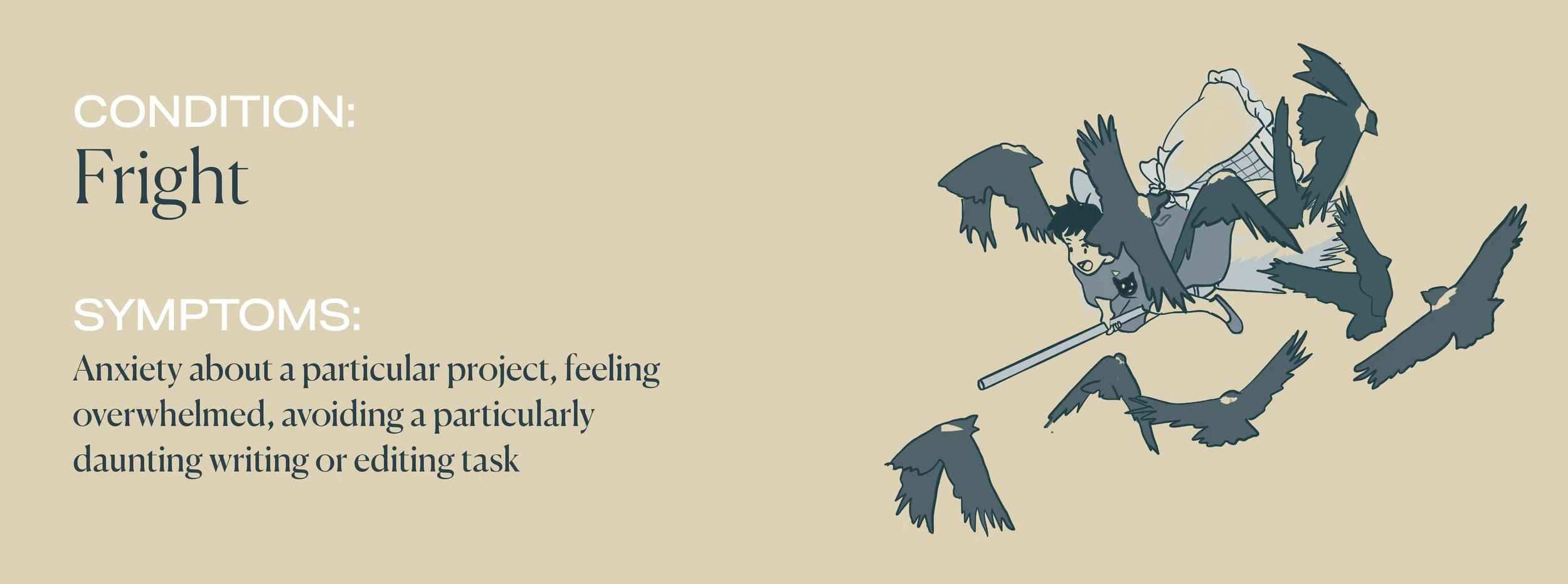What does a 1989 movie about a teenage witch have to do with writer’s block? A lot actually.
Hayao Miyazaki’s film Kiki’s Delivery Service tells the story of a young witch setting out on her own to begin her training. But from the moment she arrives in her new town, things start to go wrong. Her new neighbors are wary of outsiders, her fledgling delivery business isn’t going as well as she hoped, and she struggles with loneliness and homesickness. Overworked and exhausted, she begins to lose her magic powers. She stops being able to fly or even speak to her familiar, a sassy black cat named Jiji.
As creatives, many of us can relate to the feeling of losing our “magic powers.” This can vary in extremity from full-fledged burnout (which 77 percent of professionals say they’ve experienced) to simply feeling “blah” about what you’re working on.
The Oxford English Dictionary defines writer’s block as “a periodic lack of inspiration afflicting creative writers,” but I’m not sure this definition fully captures the nuances of my experiences with the affliction. Sure, I’ve had my inspirational slumps, but I’ve also had periods where I knew exactly what I needed to write—I just didn’t want to do it. Not to mention the special anxiety that comes from having a client request a lot of edits on a document and the overwhelming dread of having to tackle them.
Instead, I think it’s more helpful to look at different kinds of writer’s block. I would categorize them into three main varieties: freeze, flight, and fright. They all share a feeling of being unable to write, but this expresses itself in different ways.
- Freeze - a sense of paralysis or inability to make progress in your writing
- Flight - an acute lack of motivation to write
- Fright - the overwhelming dread of a daunting writing or editing task
I’ll delve into each of the types in more detail below. Having experienced all of them over the course of my writing career, I’ve come up with a few tricks for getting unstuck. Whether you’re totally blocked or just feeling a little blah, I hope these tips will help you get back in the writing groove.
1. Unfreeze Your Flow

Freeze is the feeling of being unable to make progress on a piece of writing. It’s what most people (and dictionaries) have in mind when they talk about writer’s block. Maybe you’re struggling to write anything at all—staring at your cursor flashing on a blank page, unsure of how to fill the space. Or maybe you are writing, but you don’t seem to be getting anywhere. You write sentences, just to delete them, or perhaps you spend ages fiddling with the same paragraph when you know you need to move on.
In the film, one of the things Kiki struggles most with is meeting her own high expectations. She wants everything to be absolutely perfect—down to leaving a month earlier than planned because the weather forecast is calling for a cloudless full moon and she wants to take advantage of it. Before she goes, her dad tells her that she can always come home if it doesn’t work out and she responds, “And come back a failure?!” She puts a lot of pressure on herself to do everything perfectly—which actually hinders her from experimenting and growing.
If this sounds at all familiar, you might be grappling with your tastemaker.
You can think of your tastemaker as your inner editor. It’s the little voice inside of you, honed by years of reading and writing, that tells you what good writing is. And it serves a very important purpose: When you’re revising a piece of writing, you depend on your tastemaker to tell you what works and what doesn’t. But when it comes to writing a first draft, your tastemaker can sabotage you.
See, one of the hardest parts of doing creative work is what Ira Glass calls “the gap”—the difference between your creative vision and what you’re actually capable of producing. As you become more advanced in your skills, you can start to close this gap, but your first attempts will still rarely live up to your expectations. The challenge is to let go of perfectionism and give yourself the freedom to experiment, regardless of how messy it might be.
How to tune out your tastemaker:
- Give yourself permission to suck. Creating pretty much anything worthwhile is an iterative process and you have to start somewhere—so try to limit any preemptive judgements of your work. Author Jane Smiley has a great quote about this that I’ve adopted as a mantra: “Every first draft is perfect because all the first draft has to do is exist.”
- Limit your tastemaker’s ability to edit. Try turning the brightness down on your screen so you can’t see what you’re writing, or change your font color to white. If you can’t see the words you’re putting to paper, you’re less likely to judge your ideas and might find it easier to get into the flow.
- Avoid the thought loop trap. If you find yourself rewriting the same paragraph for the fifth time or fiddling with a sentence for more than twenty minutes until it’s just right, you might be caught in a thought loop. This is where your brain defaults to old patterns to avoid the hard work of generating new ideas. The key to stopping loops is noticing that you’re in one, which is challenging, but possible. Developing your mindfulness skills—whether that’s a formal meditation habit or just the daily practice of becoming more present—can help you better recognize and stop thought loops in their tracks.
2. Write or Flight

Unlike freeze, flight is a form of writer’s block that can manifest when you know exactly what you need to write—often with pages of outlines and notes—you just feel no desire to work on it. You might even find yourself “productively procrastinating” by starting another, more enticing piece of writing. Flight is more a problem of motivation than it is of perfectionism.
I often find this kind of writer’s block creeping up on me when I’m overloaded, with a lot of tight deadlines coming up. I also sometimes develop this condition when I’m faced with a repetitive writing task. If I’m in the middle of a big block of articles for a client which are all quite similar in theme, for instance, I can sometimes start to feel my well of inspiration drying up.
It’s not surprising that this happens. Nothing kills intrinsic motivation like the need to produce. In a memorable scene, Kiki laments to herself, “Flying used to be fun until I started doing it for a living.”
Many of us writers got into this profession because, well, we enjoy it. We love the magic of transforming amorphous thoughts into concrete sentences and paragraphs. We find it satisfying to move words around the page until they sound just right. We get a lot of joy from a well-turned phrase or a clever pun. But add in an overwhelming pressure to produce—thanks to tight deadlines, many simultaneous projects, or repetitive writing assignments—and your motivation may disappear altogether.
When Kiki loses her magic powers, her artist friend Ursula offers her some sage advice: “Just stop trying. Take long walks, look at the scenery, doze off at noon—don’t even think about flying. And then pretty soon, you’ll be flying again.” Instead of overcoming the flight impulse, give into it. Let yourself off the hook and allow yourself to rediscover the joy of writing in your own time.
How to recover your motivation:
- Press pause. Removing the pressure to produce may, paradoxically, increase your excitement about writing. I first heard this writing maxim when I was in grad school, and I’ve tried to take it to heart:
If you can’t write—outline.
If you can’t outline—read.
If you can’t read—rest.
Giving yourself permission to take a break or linger in the early phases of the writing process (like researching or outlining) allows you to collect new inspiration, mull over your ideas, and return to your piece with fresh eyes.
- Buy yourself some time. If possible, try to renegotiate your deadlines. I know they can seem immovable, but in my experience, there are no emergencies in marketing. You shouldn’t do this all the time, but if you’ve ended up in a situation where you’re overloaded and run down, you’re not going to produce your best work. Taking a break is the best thing you can do, not just for your mental health, but also for the quality of your writing.
- Make space for play. Research shows that “insight” and “divergent thinking”—the building blocks of creativity—are closely tied to play. Creativity involves combining ideas in new and unexpected ways, which can only happen if you let your imagination run free. Try doing a word puzzle to get your mind going, reading a book that’s just for fun, or taking part in a creative hobby that has nothing to do with writing, like photography or crochet.
3. Face Your Fears

The final variety of writer’s block, fright, is a feeling of uneasiness about tackling a daunting writing or editing task. This dread can arise from many different sources. Maybe you’re about to embark on a big project, longer than anything you’ve ever written before. Or maybe you need to complete a serious overhaul on a piece of writing—either because you’ve realized there’s something significantly wrong with it, or you’ve received a ton of feedback from a client or colleague.
Fenwick’s Co-Founder, Chris Gillespie, describes fright this way, “When I get a Google doc back from a client and I see that it’s completely multicolored with changes and suggestions, I’m like ‘Nope,’ and quickly close it.” I can definitely relate to the feeling.
I also frequently had bouts of this kind of writer’s block when I was working on writing and eventually revising my master’s thesis. It was so monstrously large—the longest piece of work I’d ever written—that any changes to my argumentative structure felt like a massive undertaking. I was scared to move parts around, lest the entire composition collapse.
It’s okay (and totally normal!) to feel anxious about a big writing task ahead of you. But if that anxiety starts to spiral into avoidance, you might have a problem. Ignoring the ebook, or client edits, or master’s thesis you’re meant to be working on won’t actually make the problem go away—and it won’t do much to help your anxiety either. Instead, it’s better to face your task head-on.
Kiki is forced to do this when her friend Tombo is swept up by the mooring line of a runaway dirigible. As he hangs on for dear life, she realizes she’s the only one that can save him. Though she hasn’t flown in weeks, she hastily snatches up a broom from a janitor and focuses all her energy on becoming airborne.
While writing isn’t (usually) a matter of life and death, I think we writers could learn a lot from Kiki when it comes to facing our writing fears. Even though she’s anxious, she still perseveres. She doesn’t wait until she’s comfortable to spring into action—she sits with her anxiety and does what needs to be done.
How to face your writing fears:
- Acknowledge your feelings. In Indistractable, behavioral expert Nir Eyal explains that internal triggers play a large part in distraction. We procrastinate from tasks we know we should be working on because we’re trying to avoid pain—such as insecurity, feeling incompetent, or the fear that others might judge us. Instead of trying to push these feelings aside, try sitting with them. What about this particular project is making you feel uneasy? When you acknowledge your feelings, you’re much more able to recognize toxic thought patterns and develop self-compassion.
- Break your daunting task into manageable chunks. It’s a cliché, but the 10,000-mile journey truly does begin with a single step. Instead of trying to tackle everything at once, break your daunting writing task down into its smallest possible component parts. What if you wrote just one sentence? Make the action so small that you have no excuse not to do it. Chances are, once you’ve completed one micro-task, you’ll get the ball rolling and feel confident to tackle another (and another, and another).
- (Gently) push back on edits you disagree with. Not all edits are equally useful. I recently had a client edit this perfectly good sentence:
”Not only are they getting their expertise from [company], they also get it from the power of the portfolio.”
Into this jargon-filled monstrosity:
“This allows [company] to foster an expert community that surfaces and disseminates our collective IP, and activates a world-class support network of collaborators that delivers tangible value impact to our portfolio, and becomes a coveted resource to prospect management teams.”
Depending on your deadline and your relationship with the person who’s editing you, you might want to consider respectfully pushing back. (Psst, my colleague Riviera has created a handy flowchart to show you how and when to do exactly that).
Recover your magic
Writing is magic. It’s the spellwork of capturing ideas that existed only in your brain into the shapes of letters and sounds. And the enchantment of being able to share those ideas with others, many of whom you’ve never met (and may never meet). Starting to feel as though you’re losing your grip on these ‘magic powers’ can be scary, but it’s usually a sign there’s something deeper going on. Luckily, writer’s block—whether in the form of freeze, flight, or fright—is very treatable.
In fact, what Kiki does to recover her magic powers is remarkably similar to what I recommend doing to manage the different kinds of writer’s block: She stops putting so much pressure on herself, takes a break, and sits with her self-doubts until she eventually overcomes them. Witch or not, that’s a lesson I think we all can get behind.




